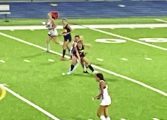My 11-year-old son threw himself on my basement floor one Monday night and sobbed because, as he said, he doesn’t see any meaning in what he does. “There’s nothing to my life,” he cried. “What’s the point?”
Dramatic? Sure. But in his wails I recognized the echoes of thoughts that have been haunting me recently. What is the point in what I do?
Of course my primary purpose is to raise my children well. But why? So that they can raise their own children well, I tell myself. I will work myself to the bone to ensure, to the extent I can, that my children, in turn, raise their own children well. But is that all we do? Raise children (hopefully) well so that they can in turn raise children (hopefully) well?
Sometimes I feel I am trapped on a hamster wheel, exuding all my energies to make sure that I, and then my children, and then their children, stay on that hamster wheel. What do we do that is outside of that hamster wheel? Why are we here other than to sustain our own weight?
Disagree if you like, but I heard in my son’s voice the echoes of my own existential doubts. And suddenly my heart swelled with pride.
I am proud he questions his place in the world. I’m proud he realizes it’s not enough to do what society dictates.
I heard him cry then rubbed my forehead. I considered carefully the words I would say next.
“I hear what you’re saying, son,” I said. “I actually think the same thoughts.” I thought briefly of telling him that education is a privilege that many lack, and that bracing ourselves for hard work early teaches dedication that serves us our entire lives. But I stopped. Tonight he needed to be heard.
“I don’t know what to tell you, honey,” I said. “Those are hard questions.”
I’ve delivered the pro-education speech a thousand times to no avail. It only brings further weeping and gnashing of teeth. When I quietly affirmed his feelings he actually – I couldn’t believe it – got up, wiped his tears, and went upstairs to do his homework.
In the kitchen I scrubbed the dishes while he sweated out his math homework by the computer and his siblings listened to music in the other room. “This is actually easier than I thought it was,” he told me with some remorse. I filed away the success of my approach. He never would have admitted that if I had given him the education speech.
He finished his math homework and pulled out his history study guide. Suddenly the wailing resumed. The pounding in my head returned. His siblings quieted in the other room.
“How am I supposed to do this?” he cried. “It’s not fair!”
Exasperated and utterly spent, I strode to the computer, hands dripping with dishwater. “Let me see your worksheet,” I said brusquely. And then I saw.
Printed among 20 questions my son was expected to answer in one night were these:
- Describe the cultural and economic interactions between Spain, France, England and American Indians.
- Explain the difference between the English and American Indian concepts of how land was to be used.
- Explain both areas of cooperation and areas of conflict between European explorers and American Indians.
- How did Ghana, Mali and Songhai become powerful?
My breath stopped. Really?
Any one of these questions could be the subject of a doctoral candidate’s dissertation.
And my son needed to answer all 20 of them tonight?
A slow rage began to burn behind my eyes. I turned away, conscious I was an example to my son’s watchful eyes. I believe in education, I told myself. I was a teacher. I glanced at the study guide again.
I started to speak, then stopped. The sentences I formulated drooped in my mind like wilted flowers.
“Yes, son,” I imagined myself saying. “You’re supposed to come straight home, and not be in day care after school. You can’t go outside on your one afternoon a week and actually be a boy, play with bikes and pocket knives, and throw rocks with friends into the stream. You stay here, do your chores, practice your instrument for half an hour, eat dinner with us, read your required minutes, do your math homework, complete this worksheet…then go to bed.”
And no sports, I added. My kids don’t do sports because I can’t fathom how to add them into our schedule. But I worry they are missing out.
In the living room my two younger children flipped on a TV show, a reward for finishing all their required tasks before bedtime. My sixth grader listened to the sounds of the show and started to wail again.
“Son,” I said, “just do your best with these questions in 20 minutes and if your teacher doesn’t like your answers, I’ll ask him tomorrow what kind of detail he was expecting.”
It was as non-threatening an answer as I, a former teacher, could formulate. Thankfully, it took.
My son dutifully filled out his worksheet with one-liners – all he could do in 20 minutes – and headed to bed. My children have a painfully early bedtime that I refuse to relax. They wake at 6 a.m. to catch the county school bus and they have yet to show me they can function on less sleep than what they get when they’re tucked into bed at 8:30 p.m. Nevertheless, they chafe at the ignominy of an early bedtime.
“Good night,” I whispered to my son as he snuggled into bed earlier than his classmates.
“I’m tired,” he said simply as his tear-stained face searched for his beloved stuffed animal.
“I know,” I said as I arranged his blanket around him. “I love you.”
Editor’s note: As a former teacher, I am keenly aware of the pressure dynamic in education. School Boards and superintendents bear down on principals and teachers. But they, in turn, can be held hostage to state and federal regulations that can tie desperately-needed money to test results. Though there is much to celebrate in public school systems, there is much that needs to change.




